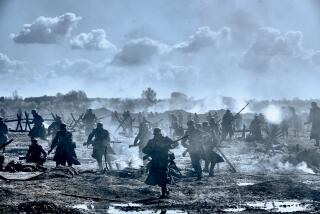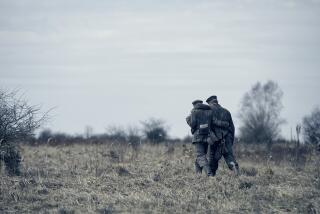ONCE FEARED LOST TO NAZIS : RESTORED GERMAN FILM WITH GAY THEME ON KCET
- Share via
NEW YORK — A portion of a landmark 1919 German film, which was banned and later thought to have been destroyed by the Nazis because of its plea for tolerance of homosexuals, has been restored for presentation on public television.
“Different From the Others” stars late, noted German actor Conrad Veidt (“The Cabinet of Dr. Caligari”) as a famous concert musician who is blackmailed because he is a homosexual. He is later sentenced to prison under a German statute--still on the books in Germany--which forbids certain sex acts between men. The character eventually commits suicide.
The restored, 23-minute fragment from the silent film, which makes the story clearer and includes the film’s plea for tolerance, is scheduled to be seen in Los Angeles on KCET-TV Channel 28 at 11 p.m. Sunday in conjunction with national Gay Pride Week.
“It’s our job in public television to develop programming for a variety of audiences, and this includes the gay community,” said Harry Chancey, the official of New York’s WNET-TV who spearheaded the effort to restore and update the film fragment for presentation on the New York and Los Angeles stations. Chancey said he hopes to make the new version available to other public television stations around the country later.
Chancey learned of the existence of the film fragment from Vito Russo, a recognized authority on the history of homosexuals in films. Russo appears at the beginning and end of the 30-minute version made for public television “to set the film in context.” But, except for the addition of English subtitles and a new piano score, the original portion of the film is unchanged.
The full version of the film, by German director Richard Oswald, has been missing since 1920, when it was banned from theaters by political forces that later became the German Nazi Party. Homosexuals were a principal target of the party from the start, and at least 250,000 are known to eventually have died in concentration camps under the Nazis.
“This film fragment survives as an accident of history,” Russo said. The 23-minute fragment was accidentally discovered in an East Berlin vault by Dutch gay activists in 1976, he said. This version, with Ukrainian subtitles, found its way to UCLA’s film archives and was shown last year at the San Francisco Gay Film Festival.
According to Russo, what is known of the rest of the film comes from publicity stills that have survived and from Russo’s conversations about the historical film with the late writer Christopher Isherwood.
Ironically, the surviving segment preserves that part of the film that no doubt caused its suppression and that makes it a milestone: a noted physician and homosexual rights advocate of the day, Dr. Magnus Hirschfeld not only served as adviser to the film but also appeared in it to challenge the German statute and to make the film’s plea for tolerance.
“In its own way, this film, with its obligatory suicide, set a tragic tone for scores of homosexual characters in films for the next six decades,” Russo said.
More to Read
Only good movies
Get the Indie Focus newsletter, Mark Olsen's weekly guide to the world of cinema.
You may occasionally receive promotional content from the Los Angeles Times.







